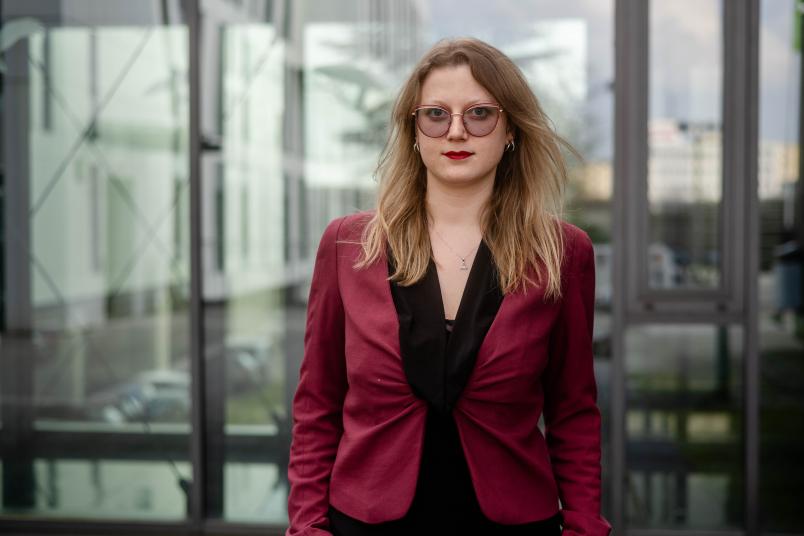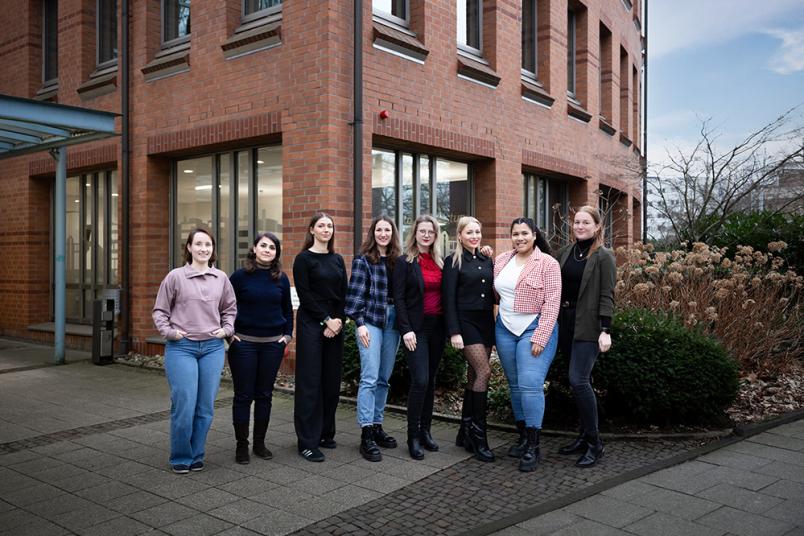
Mechanochemistry
“I started to think bigger and want more”
The start-up Mechanolution aims to make chemical synthesis more environment-friendly. Desislava Dobreva’s main motivation to start a business? The freedom to pursue her own vision.
Desislava Dobreva is bursting with ideas. The Bulgarian chemist not only leads her own cosmetics company and is currently working on her doctoral thesis at Ruhr University Bochum, but she is also developing an innovative start-up idea. With Mechanolution, Dobreva strives to put her scientific knowledge in mechanochemistry into practice, aiming at making chemical synthesis of ingredients, for example for cosmetics and pharmaceuticals, more environment-friendly. To achieve this, she uses mechanical energy instead of solvents to drive chemical reactions. Dangerous chemicals are used less frequently and time and money can be saved by reducing the number of processing steps.
In this interview, Desislava Dobreva explains why more work means more freedom for her and why she has no problem leaving her comfort zone.
Ms Dobreva, you are from Bulgaria. What led you to Ruhr University Bochum?
I completed my Bachelor's degree in Chemistry in the Bulgarian capital Sofia. Since it had always been my dream to live and study in Germany, I decided to apply for a Master's degree at Ruhr University in 2017 to continue my studies. I never applied anywhere else, because for me it was Ruhr University or none at all. After successfully completing my Master's thesis in Prof Lars Borchardt's research group at the Chair of Inorganic Chemistry, I felt really inspired by the research field and now I'm in my third-year as a PhD student.

Our goal is to transform already existing processes into more sustainable ones and thereby revolutionize the chemical industry.
What is the idea behind your start-up Mechanolution?
Mechanolution tries to implement greener processes in chemical synthesis. It uses an innovative technique called mechanochemistry which has many advantages, such as reducing waste and CO2 emissions. It is also more energy efficient and has a high productivity. Our goal is to transform already existing processes into more sustainable ones and thereby revolutionize the chemical industry.
Have you always wanted to start your own business?
Not always. When I was a child, I wanted to work in a large pharmaceutical company in Germany, which is why I came to North Rhine-Westphalia. But as I grew older, my interests broadened and I started to think bigger and want more.
Was there a particular moment when you realised that you wanted to start your own business?
I remember looking at job advertisments and not liking any of them. I realized that, as an employee, I would always come up against limits in my professional development. Once you've reached the highest position, there're no real challenges anymore, unless you become a business partner, which is very unlikely. At least that's how I see it.

Instead of working for an employer who may not share my vision or passion, I can fully embrace my ideas.
Was it a difficult decision for you to set up the company?
The decision was quite easy for me. I want freedom. And yes, self-employment probably means even more work than a nine-to-five job, but at least I can do things at my own pace. Self-employment gives me the opportunity to realise my passion, hobbies and strengths in a business and earn money doing something I love. Instead of working for an employer who may not share my vision or passion, I can fully embrace my ideas and bring them to life without any restrictions.
Are there differences between the German and Bulgarian start-up culture?
According to the latest Eurobarometer survey, Bulgaria ranks first in Europe in terms of the percentage of young people who want to start their own business. I can definitely confirm that we have a strong entrepreneurial mind-set. This can be attributed to a greater willingness to take risks and more entrepreneurial role models.

I have the impression that Germans like to feel safe and avoid taking too many risks.
Perhaps the main difference is that we don't mind getting out of our comfort zone. I have the impression that Germans like to feel safe and avoid taking too many risks. Another key observation is that a lot of German entrepreneurs wait until they have been working in a profession for around 20 years. Only when they believe they have gained enough knowledge, they decide to start their own business and become CEOs at the age of 40. I personally don't share this view. Of course, an entrepreneur should have some experience, but you don't need to have figured it all out. The most important thing is to be flexible and able to adapt to change.
How do those around you react when you tell them that you are founding a start-up?
I would say that my decision is received positively. People are interested, want to know more details and wish me luck.
Have you encountered any hurdles or prejudices in the start-up process so far?
I would say that finding funding has been one of the most difficult tasks so far. With such a capital-intensive start-up idea, you need a lot of financial support. Matching with potential co-founders is another difficulty. I was very lucky to meet my current business partner Sebastian Grothaus. Before that, however, there were a couple of fruitless collaboration attempts. I also experienced the gender bias to a certain extent, but I have the feeling that this has improved over time and people have become more open and accepting.

You should never give up on your dreams, no matter what others tell you.
What have you learnt from this?
It's important to know how to sell your start-up idea and how to communicate effectively with people. Also, you should never give up on your dreams, no matter what others tell you.
Where did you find support at Ruhr University?
I received and I'm still receiving tremendous help from the WORLDFACTORY Start-up Center and in particular from Start4Chem and FACE. The coaching sessions and workshops have broadened my knowledge and I met a lot of inspirational people during the networking events. It feels like I'm part of a community where everyone helps each other and is always welcoming and friendly.
What advice do you have for women interested in starting their own business?
Be brave and just give it a try. Don't be afraid to make mistakes because failure is part of life and you should see it as an opportunity.
About Start4Chem
